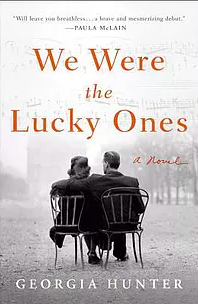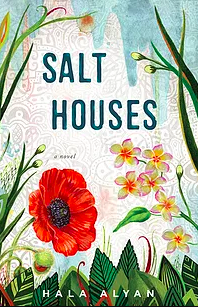
Like the perfect wine to complement your meal, certain books go well together, bringing more meaning to the experience when read together. That is the concept of my new book column, Book Pairings. Some of these pairings will be deliberate and I’m sure more will come together on their own as I read and notice similar themes.
My first pairing, We Were the Lucky Ones by Georgia Hunter and Salt Houses by Hala Alyan, came from my monthly book club. Initially, we read Hunter’s book about a Jewish family in Poland during the Holocaust. The women in my book group have all read many books about Europe during World War II and the Holocaust, so this felt like familiar territory. For our next selection, I heard about Salt Houses by Hala Alyan, a new book by a Palestinian American author about a Palestinian family forced to leave their home during wartime, and we all agreed to step out of our comfort zones and read it. I hoped this pairing would help us find parallels between these two groups of people and reveal the common humanity underneath, and I was right.
In We Were the Lucky Ones, Hunter writes about the Kurc Family including the parents and their five children. We spend the most time with the middle child, Addy Kurc, based on Hunter’s grandfather who she learned was Jewish only after his death. Given a high school project to interview a family member, she learned from her grandmother that her grandfather, his siblings, and his parents all escaped the Nazis in Poland during World War II. Years later, she embarked on extensive research including interviews with many of her grandfather’s relatives around the world, to gather stories and information for the book. I’m so glad she decided to write this a fictional story based in truth. The inner thoughts dialogue and relationships add depth and emotion too the story. The characters’ journeys take us to places not often explored in Holocaust literature including Siberia, the Polish countryside, the French Alps, Italy and Brazil. Every character has an interesting story, but I found Addy’s the most compelling, probably because he was based on Hunter’s grandfather and she had the most information on the details of his life and a personal connection to him.

In Salt Houses, Alyan touches on similar themes through the eyes of a Palestinian family. The story spans from 1963 to 2014 and follows the members of the Yacoub family from Jaffa to Nablus to Amman to Lebanon and even to Boston. As in the first book, the reader spends time with many of the family members to understand how the atrocities and displacement of war affect each of them, how these experiences become woven inextricably into their emotional cores. I cried for nearly every character as I learned how each of them was irreversibly changed by the need to move from their beloved homes and begin again. Alyan’s writing is nuances and evocative. She uses all of the senses to bring the character’s experiences to life, and make them linger with the reader long after the book is finished.
“Nostalgia is an affliction. Someone said that once in front of Alia, and the words reach her now, years later. Like a fever or a cancer, the longing for what had vanished wasting a person away. Not just the unbearable losses, but the small things as well. Alia thinks of her bedroom in Nablus. The seashells she filled with bobby pins. The tangerine dress she’d bought right before her trip to Kuwait and never worn. Photographs, necklaces, the glasses and silver ibrik her mother had given her. You cannot forget them in your grief.”
Both of these novels are must reads, to learn about the diaspora caused by war, but more importantly to illustrate the resilience of the human spirit and the strength of family ties, regardless of ethnicity or skin color.
